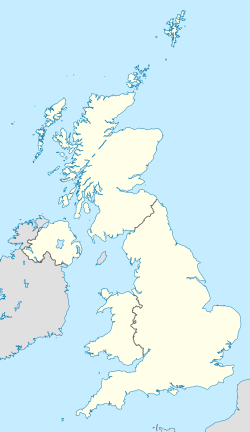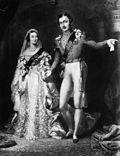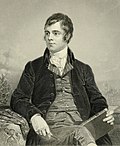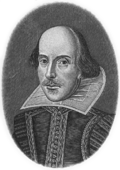Portal:United Kingdom
The United Kingdom Portal
 |
 |

| |
The United Kingdom of Great Britain and Northern Ireland, commonly known as the United Kingdom (UK) or Britain, is a country in Northwestern Europe, off the coast of the continental mainland. It comprises England, Scotland, Wales, and Northern Ireland. The UK includes the island of Great Britain, the north-eastern part of the island of Ireland, and most of the smaller islands within the British Isles, covering 94,354 square miles (244,376 km2). Northern Ireland shares a land border with the Republic of Ireland; otherwise, the United Kingdom is surrounded by the Atlantic Ocean, the North Sea, the English Channel, the Celtic Sea, and the Irish Sea. The UK maintains sovereignty over the British Overseas Territories, which are located across various oceans and seas globally. The United Kingdom had an estimated population of over 68.2 million people in 2023. The capital and largest city of both England and the United Kingdom is London. The cities of Edinburgh, Cardiff, and Belfast are the national capitals of Scotland, Wales, and Northern Ireland, respectively.
The UK has been inhabited continuously since the Neolithic. In AD 43, the Roman conquest of Britain began; the Roman departure was followed by Anglo-Saxon settlement. In 1066, the Normans conquered England. With the end of the Wars of the Roses, the English state stabilised and began to grow in power, resulting by the 16th century in the annexation of Wales, and the establishment of the British Empire. Over the course of the 17th century, the role of the British monarchy was reduced, particularly as a result of the English Civil War. In 1707, the Kingdom of England and the Kingdom of Scotland united under the Treaty of Union to create the Kingdom of Great Britain. In the Georgian era, the office of prime minister became established. The Acts of Union 1800 incorporated the Kingdom of Ireland to create the United Kingdom of Great Britain and Ireland in 1801. Most of Ireland seceded from the UK in 1922 as the Irish Free State, and the Royal and Parliamentary Titles Act 1927 created the present United Kingdom.
The UK became the first industrialised country and was the world's foremost power for the majority of the 19th and early 20th centuries, particularly during the Pax Britannica between 1815 and 1914. The British Empire was the leading economic power for most of the 19th century, a position supported by its agricultural prosperity, its role as a dominant trading nation, a massive industrial capacity, significant technological achievements, and the rise of 19th-century London as the world's principal financial centre. At its height in the 1920s, the British Empire encompassed almost a quarter of the world's landmass and population, and was the largest empire in history. However, its involvement in the First World War and the Second World War damaged Britain's economic power and a global wave of decolonisation led to the independence of most British colonies. (Full article...)
Featured article
Sheerness is a town located beside the mouth of the River Medway on the northwest corner of the Isle of Sheppey in north Kent, England. With a population of 12,000, it is the largest town on the island. Sheerness began as a fort built in the sixteenth century to protect the River Medway from naval invasion. After a Dutch attack in 1692, Samuel Pepys, the Secretary to the Admiralty, established a Royal Navy dockyard in the town, where warships were built and repaired until its closure in 1960. In the nineteenth century, Sheerness also became a seaside resort, when a pier and promenade were constructed. Industry remains an important part of the town, and the port of Sheerness is one of the United Kingdom's leading car and fresh produce importers. The town is the site of one of the UK's first co-operative societies and the world's first multi-storey building with a rigid metal frame. (Full article...)
Featured biography
George I was King of Great Britain and Ireland, from 1 August 1714 until his death. At the age of 54, he ascended the British throne as the first monarch of the House of Hanover. Although many bore closer blood-relationships to the childless Queen Anne, the Act of Settlement 1701, which prohibits Catholics from inheriting the throne, designated her cousin, Sophia of Hanover, as heiress to the throne. Sophia was Anne's closest living Protestant relative but died a matter of weeks before Anne leaving the Protestant succession to her son, George. In reaction, the Jacobites attempted to depose George and replace him with Anne's Catholic half-brother, James Francis Edward Stuart, but their attempts failed. During George's reign in Britain, the powers of the monarchy diminished and the modern system of Cabinet government led by a Prime Minister underwent development. Towards the end of his reign, actual power was held by Sir Robert Walpole. George died on a trip to his native Hanover, where he was buried. (Full article...)
General images -
Subportals
WikiProjects
Things you can do
- Visit the British Wikipedians' notice board.
- The noticeboard is the central forum for information and discussion on editing related to the United Kingdom.
- Comment at the British deletion sorting page.
- This page lists deletion discussions on topics relating to the United Kingdom.
Featured pictures
Did you know -

- ... that Ruth Northway is the United Kingdom's first professor of learning disability nursing?
- ... that in 1943, Bhicoo Batlivala led a group of Indian women to the House of Commons to request the release of Gandhi from prison?
- ... that despite being an independent candidate, Leanne Mohamad came within 528 votes of defeating shadow health secretary Wes Streeting in the 2024 UK general election?
- ... that, before same-sex unions were legally recognised in the UK, the London Partnership Register allowed nearly 1,000 couples to celebrate their relationships?
- ... that South African president Jacob Zuma requested a tour of a Sainsbury's supermarket during his state visit to the United Kingdom in 2010?
- ... that a yellow-spotted emerald specimen was found for the first time in the United Kingdom in 2018, when a wildlife photographer used Twitter to identify it?
In the news
- 10 April 2025 –
- The United Kingdom's Cabinet Office announces it will cut around 2,100 jobs from its department, about a third of its total workforce, as part of wider government spending cuts. (BBC News)
- 9 April 2025 –
- Universal Destinations & Experiences formally announces that they have chosen a site near Kempston Hardwick in Bedfordshire, England, as the location for their Universal Studios United Kingdom resort. The theme park will officially open in 2031 and will be the largest theme park in the UK upon completion. (AP)
- 7 April 2025 –
- The first birth of a baby in the United Kingdom to a woman with a transplanted womb is announced. The baby girl, delivered at Queen Charlotte's and Chelsea Hospital in London to a 36-year-old woman, is reported to be healthy. (BBC News)
- 5 April 2025 – Tariffs in the second Trump administration, Executive orders in the second presidency of Donald Trump
- UK-based multinational car manufacturer Jaguar Land Rover suspends vehicle exports to the United States for a month to evaluate the impact of Trump's tariffs on the automotive industry. (Fox Business)
- 5 April 2025 – Israel–United Kingdom relations
- Israel blocks two British Labour Party MPs from entering the country. (Reuters)
- 3 April 2025 – Tariffs in the second Trump administration
- A 25% tariff on all automotive imports into the United States enters force. No exemptions are announced despite requests from several major trade partners, including Japan and the United Kingdom. (Reuters)
Categories
Other UK-connected Wikipedias
Wikimedia
The following Wikimedia Foundation sister projects provide more on this subject:
-
Commons
Free media repository -
Wikibooks
Free textbooks and manuals -
Wikidata
Free knowledge base -
Wikinews
Free-content news -
Wikiquote
Collection of quotations -
Wikisource
Free-content library -
Wikiversity
Free learning tools -
Wikivoyage
Free travel guide -
Wiktionary
Dictionary and thesaurus
























































































































